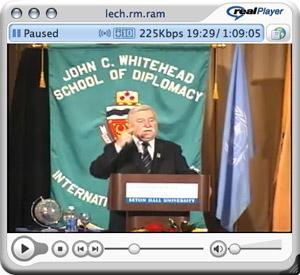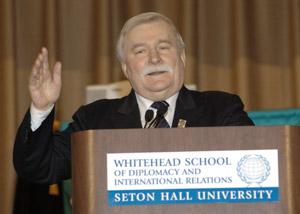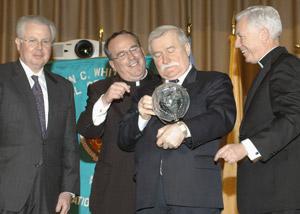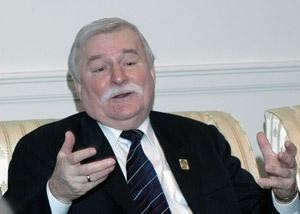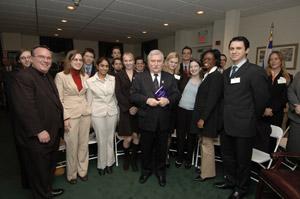Walesa Supports Freedom Infused with Values
Friday, December 2, 2005
|
Though modern society is vastly different than it was just 25 years ago, Lech Walesa, former president of Poland and Nobel Peace Prize winner, offered insight to the Seton Hall community about the world's future, based on his experiences as the leader of the 1980s Polish Solidarity movement.
Walesa addressed a crowd of nearly 1,500 as part of the John C. Whitehead School of Diplomacy and International Relations' World Leaders Forum on Thursday, December 1. Following his speech, Kurt Borowsky ཹ, chair of Seton Hall's Board of Regents, conferred upon Walesa an honorary Doctor of Laws degree. Seton Hall honored Walesa more than 23 years ago with this degree, but he was unable to attend the ceremony for fear that Poland's communist government would not allow him to return home.
University President Monsignor Robert Sheeran ཿ called Walesa an outstanding servant leader whose persistence and bravery enabled the Solidarity movement to triumph and helped bring an end to communist rule in Poland. "He is proof that someone from the most unremarkable of circumstances — a tradesman in a shipyard — can become a most remarkable man," he noted.
Commemorating the 25th anniversary of the historic 1980 strike by Solidarity, then an underground labor movement that Walesa helped create, Walesa's visit to Seton Hall was nothing less than monumental. The 1980 strike at a Lenin ship yard in Gdansk increased the momentum of the Solidarity movement, which eventually led to successful negotiations for free trade unions, pay raises, relaxed press censorship and the right to strike, itself.
Historical circumstances influence today's world, according to Walesa. "This is a very special generation," he said. "Not only did we witness the beginning of a new century and a new millennium, but we are witnessing the beginning of a new era. And from an era of hostility, we are passing into the era of intellect, information and globalization."
Walesa said that the opportunity for peace and prosperity exists, but a restructuring of the institutional frameworks by which the United States and other nations structure their ideals is necessary. Deeply influenced by the late Pope John Paul II, Walesa said it is not possible to emphasize freedoms without focusing on values.
"We are unfit for the new world because, the higher the civilization, the higher the technological progress, the bigger the territory — the more we need values," Walesa remarked.
Pope John Paul II, from Poland himself, brought much needed attention to the Solidarity movement. "The Holy Father awoke the nation, and nations," Walesa said, referring to Poland and other countries around the world. "The Holy Father did not encourage us to fight or struggle or involve ourselves in any conspiracy. The words he said were so convincing that each of us had to reflect on our own selves. We looked around and saw how many of us there were. Those awoken nations let themselves be led through strikes and negations to freedom." The Solidarity movement eventually became more than 10 million strong.
Much of Walesa's address was about how the United States, as a world superpower, has the capacity to make great changes. But the most effective changes, he said, will come when the focus on freedom is infused with a focus on values.
"If we want to survive the 21st century, if we want to establish a better living, we have to have an era of solidarity," Walesa said, not referring to the specific movement, but instead to an emphasis on humane approaches to everyday living.
"We are a very, very special generation," Walesa repeated. "A very special opportunity awaits us. Let us not waste it."
The Whitehead School's World Leaders Forum promotes dialogue on today's critical global concerns. International leaders, including Mikhail Gorbachev, former president of the Soviet Union; Shimon Peres, former Israeli Prime Minister; and Kofi Annan, U.N. Secretary-General, have visited Seton Hall to address complex and controversial issues and encourage dialogue in search of new avenues for building peace.
For more information on the Solidarity movement, visit the Whitehead School of Diplomacy Web site.


